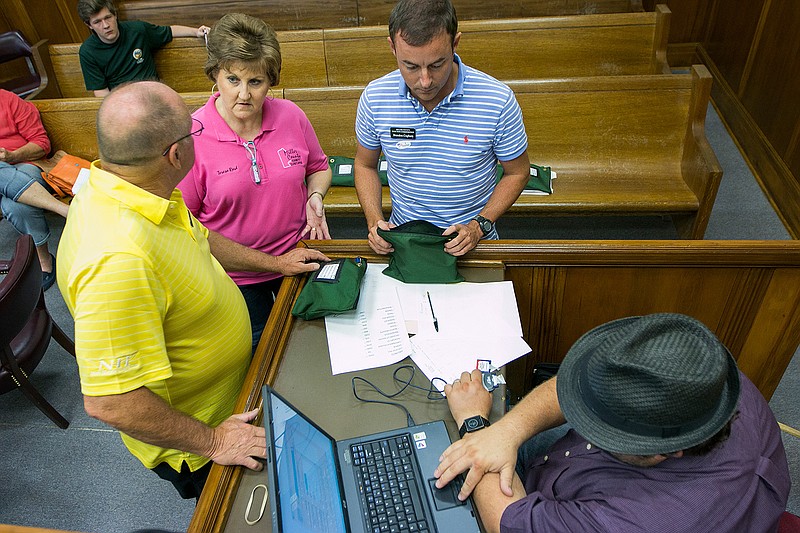Voters repealed the city of Texarkana, Ark.'s, controversial nondiscrimination ordinance Tuesday, ending the latest skirmish in a nationwide conflict over lesbian, gay, bisexual and transgender rights.
By a vote of 3,409 to 881, residents chose in a special election to rescind city Ordinance No. M-130 in its entirety, according to complete but unofficial results.
Once election results are certified, they will be recorded by the city clerk, and at that point the ordinance officially will cease to be in effect, Arkansas-side City Attorney George Matteson said. It had been suspended pending the outcome of the election.
"Whatever the result, it's the will of the people, and that's how we will conduct business," Ward 3 Director Tim Johnson, M-130's original sponsor, said Tuesday morning.At a celebration Tuesday night in downtown's Omega Building, Richard Wagnon, leader of the anti-ordinance group the Repeal 130 Committee, expressed gratitude to voters.
"I'm very humbled and appreciative of the people of Texarkana, Ark.," he said. "This says that we the people get to decide for ourselves what our community standards are."
Dennis Young, a former Arkansas-side ward director and former Texarkana House representative who was active in the pro-ordinance group Keep M-130, conceded defeat but expressed hope for change.
"What else can you say except that we got whipped?" he said. "Unfortunately, Texarkana, Ark., is the loser in the long run, as in the manner of how we will be viewed by others. Thanks to those who wanted our city to be viewed as a progressive, tolerant city, the fight for equality for all will continue."
The ordinance prohibited the city and businesses that contract with it from discriminating on the basis of a long list of characteristics, including sexual orientation and gender identity.
M-130 sparked controversy immediately upon its unanimous passage by the city Board of Directors in January. In March, ordinance opponents filed a petition forcing Tuesday's election.
The vote came after weeks of polarizing public debate. Proponents of M-130 argued it was a progressive acknowledgment of LGBT rights that would attract business to the city. Critics focused on the claim that it would allow transgender people to use the public restrooms of their choice, which they called indecent and a danger to women and children.
The election took place as communities across the nation focus on nondiscrimination laws as a new front in the battle over LGBT rights.
The repeal echoes voters' defeat of the Houston Equal Rights Ordinance last November, following an intense campaign by anti-ordinance advocates. They, too, spotlighted the transgender restroom issue, dubbing HERO the "bathroom ordinance" and distributing yard signs that read "NO Men in Women's Bathrooms."
Similar elections, fought over along the same lines, in recent years have rescinded nondiscrimination ordinances in Springfield, Mo.; Chattanooga, Tenn.; Salina, Kan.; and Hutchinson, Kan.
Citizens of Pocatello, Idaho; Traverse City, Mich.; and Gainesville, Fla., voted to keep their cities' nondiscrimination laws in place.
In Fayetteville, Ark., voters repealed a nondiscrimination ordinance-including sexual orientation and gender identity-in December 2014 but approved a different law protecting LGBT rights last September.
In Arkansas, Tennessee and North Carolina, state legislatures have sought to overturn municipal nondiscrimination ordinances that include LGBT protections by outlawing their adoption.
Last year, Arkansas lawmakers passed Act 137, which prohibits any local government from having nondiscrimination rules that exceed those enacted at the state level. Most Arkansas nondiscrimination statutes do not include sexual orientation or gender identity as a protected class.
Act 137 has not been challenged in court, and nondiscrimination ordinances with LGBT protections are in effect in Eureka Springs, Hot Springs, Fayetteville and Little Rock.
An April 2015 analysis by Little Rock City Attorney Thomas M. Carpenter concluded that Little Rock's nondiscrimination ordinance, which M-130 mirrored, does not violate Act 137 because sexual orientation and gender identity are classes protected by some state laws, including an anti-bullying statute.
"As to intrastate commerce, the proposed ordinance does not create any protected class, nor does it list any prohibited discrimination not already protected by state law," Carpenter's opinion states. "As to discrimination on activities in interstate commerce, Act 137 by its express terms does not apply."
In 2011, the Tennessee legislature passed a similar bill prohibiting local nondiscrimination laws that differ from the state's.
Most recently, North Carolina lawmakers convened a special legislative session in March to override a Charlotte ordinance that protected transgender people's restroom choices. The legislature passed a law prohibiting local governments from enacting any nondiscrimination measures.
The North Carolina bill became a national news story, resulting in businesses-including General Electric and Hewlett Packard-boycotting the state, as well as celebrities-including Bruce Springsteen and Ringo Starr-refusing to perform there.
In May, the U.S. Department of Justice filed a federal civil rights lawsuit challenging the North Carolina legislation as discriminatory against transgender people.
Days later, the U.S. Department of Education sent a letter to public schools stating that federal law requires them to let transgender students use the restrooms and locker rooms corresponding to their gender identities. Several states, including Texas, responded with a lawsuit seeking to block the order.


